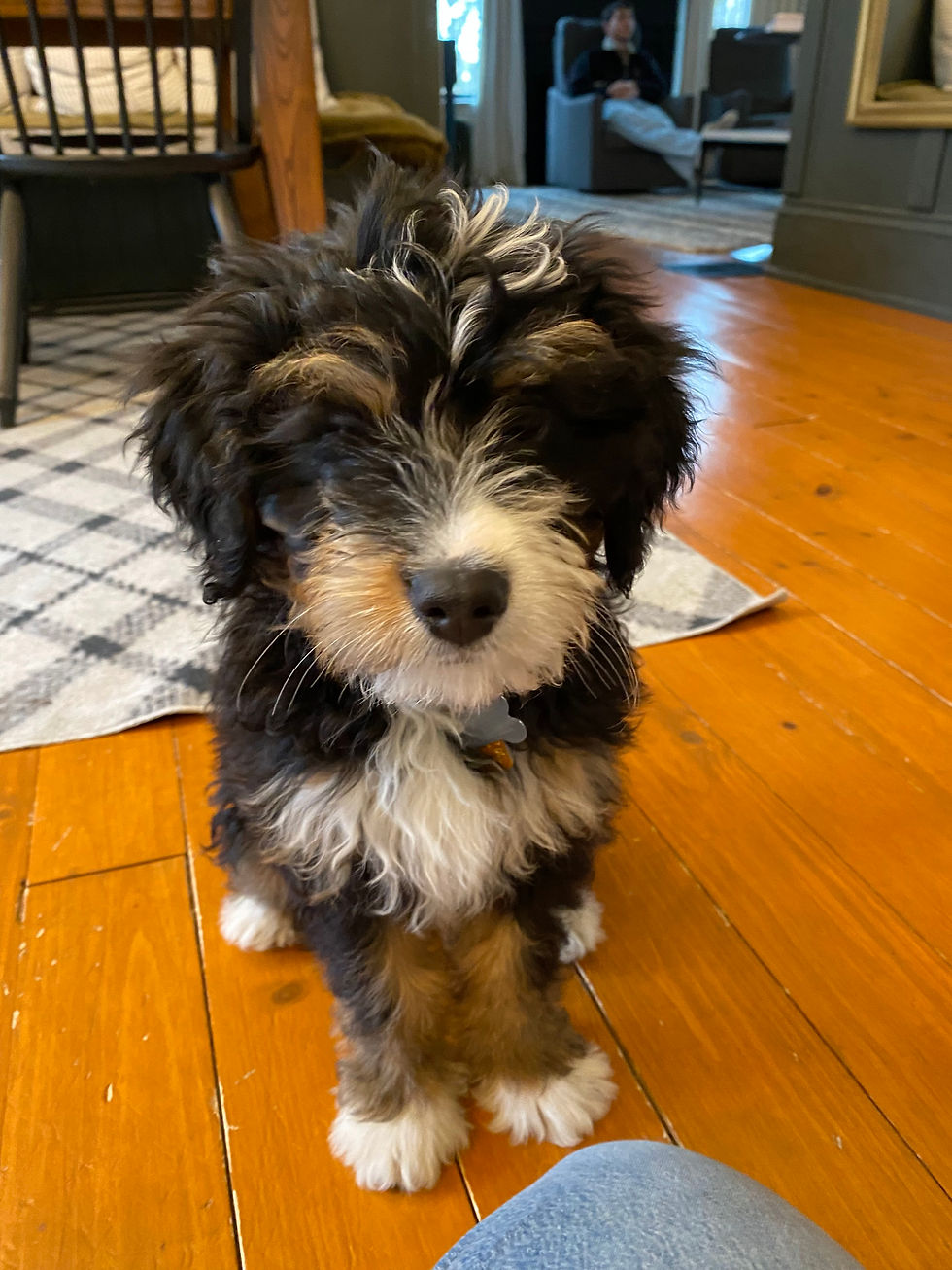First Night with Puppy
- woodbriaramds
- Apr 13, 2025
- 4 min read
Updated: Apr 25, 2025

Surviving the First Night
Congratulations—it's the big day! You've gathered the gear, puppy-proofed your space, and now... the adorable little fluff has arrived. It's exciting, it's heart-melting—and yep, it's also almost bedtime.
Pro Tip: If you can, pick your puppy up earlier in the day. Giving them several hours to explore and settle into their new surroundings before nightfall can really help ease the transition into bedtime.
Welcome to the first night.
1. Keep Expectations Realistic
Let’s be honest—this night probably won’t be restful. Your puppy just left everything familiar: their littermates, their mom, and the only world they’ve ever known. Now they’re in a strange place with new smells, sounds, and humans. Cue the whining, crying, and middle-of-the-night potty breaks.
2. Set Up the Sleep Zone
Ideally, your puppy should sleep in a crate next to your bed during those first few nights. This helps them feel safe and lets you easily handle bathroom trips or comfort them if they get scared. After a few nights, you can slowly move the crate to wherever you'd like your puppy to sleep long-term—whether that's still in your bedroom, another room, or a designated puppy area.
Make the crate inviting and snug:
Add a soft blanket, crate pad, or even a cozy towel
Drape a crate cover or light blanket over the top to create a calm, den-like atmosphere
Include a snuggle toy, such as a Snuggle Puppy (link to the one we love that includes a heartbeat and a heating element)
Consider using a white noise machine or play classical music to create a soothing soundscape that can help your puppy relax and stay quiet during the night
3. Stick to a Routine
Give your pup the best chance at a good night by setting up a calming bedtime routine:
Final potty trip after no food for at least two hours and no water for at least one hour before bed
A few minutes of quiet cuddle time or gentle play
Lights out, consistent bedtime
4. Nighttime Potty Breaks
Your puppy will give you signals when they need to go—usually a soft whine or a sudden fuss after being asleep. If they stir or cry, give them a moment to settle. If they don't, it's likely potty time. When you take them out, keep things calm and all-business: no chatting, no playing, no eye contact. Just a quick potty break and then straight back into the crate. This helps teach them that nighttime is for sleeping, not socializing.
You might need to sit by their crate for a bit after the potty break, so they know they’re not alone. Offering a calm presence—or even gently resting your hand inside the crate for an ear rub—can work wonders.
Don’t worry, these midnight wakeups don’t last forever. In just a few nights, most puppies (depending on size) can sleep 6–8 hours without needing a potty break. You’ll be catching those uninterrupted Zs again before you know it. Hang in there—you’ve got this!
5. Whining: What’s Normal?
Whining is completely normal as your puppy adjusts to their brand-new world. You’re not being cold-hearted by letting them fuss a bit—it’s part of their learning to self-soothe. That said, if their whining gets louder, more frantic, or changes tone, it’s time to check if they need to go potty or if something else might be wrong.
You might find yourself wondering how something so tiny can make so much noise! But here’s what’s really going on: when a puppy leaves their littermates, their mother, and the only life they’ve ever known, they naturally experience separation anxiety. Those cries? They’re instinctual calls to their mom: “I’m here come find me!”
Understanding this can make it a little easier to be patient and sympathetic. With your comfort and calm reassurance, your puppy will soon learn they’re safe, loved, and home. And the good news? In just a night or two, this usually fades—and your pup will be sleeping like a (very fluffy) baby.
6. Common First-Night Mistakes to Avoid
Even the best-prepared puppy parents hit a few bumps. Here are some things to steer clear of:
Giving in to every whimper – If you rush to your pup the second they make a sound, they’ll learn to cry for attention rather than for real needs. Wait, assess, then respond.
Letting them sleep in your bed "just this once" – It’s tempting, especially when they're crying, but this can set a tough-to-break habit.
Overstimulating before bed – A game of tug at 9:45 p.m. might be fun, but it won’t help anyone wind down.
Skipping crate training the first night – Start as you mean to go on. It’s harder to introduce the crate later.
Panicking when things don’t go perfectly – There will be hiccups. You’re learning each other. Grace over guilt.
7. Don’t Panic
You’re doing great. Yes, you’re tired. Yes, you’re googling “puppy won’t stop crying help.” But this stage doesn’t last forever. With consistency, comfort, and patience, your pup will settle into their new life—and sleep schedule—soon.



Comments